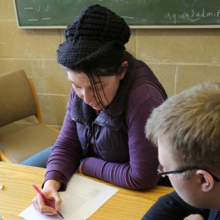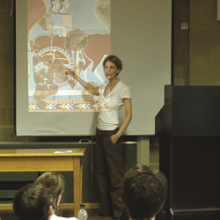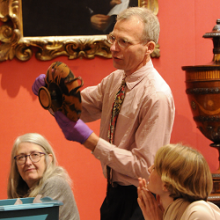The undergraduate course is divided into four years, called Prelims, Part 1A, Part 1B, and Part 2. If you have Latin A level or equivalent and are thinking of applying for the three-year version of the degree, you can skip over the section on Prelims.
 Prelims (four-year course only)
Prelims (four-year course only)
Prelims is devoted largely to intensive study of Latin. Experts in language instruction will guide you and, as your skills improve, you will move from textbooks to Latin literature by Cicero, Ovid, Catullus and even the Emperor Augustus. However, there is much more on offer than language classes: the Latin that you study is set in the general context of Roman culture through lectures and supervisions. (For more info on the types of teaching, see the How We Teach page).
In the second term you will also start classes in Ancient Greek, and over the summer we run a short, free intensive course in Greek to help prepare you for Part 1A.
Part 1A
Part 1A centres on a carefully designed selection of Latin and Greek texts, which will help you develop your reading skills in both languages, and also introduce you to various aspects of Greek and Roman culture - literature, history, linguistics, art and archaeology. You will attend a range of lectures and supervisions on all these areas, and pick two of them to focus on as the year progresses.
 The main variety within Part 1A comes with your linguistic background. We believe that you cannot get fully to grips with a culture unless you have learnt its language: this is crucial, for example, in appreciating literature and evaluating historical evidence, rather than having to trust in another person's translation. Therefore throughout Part 1 there is a strong emphasis on developing your Latin and Greek language skills.
The main variety within Part 1A comes with your linguistic background. We believe that you cannot get fully to grips with a culture unless you have learnt its language: this is crucial, for example, in appreciating literature and evaluating historical evidence, rather than having to trust in another person's translation. Therefore throughout Part 1 there is a strong emphasis on developing your Latin and Greek language skills.
People on the four-year degree, who have come through Prelims, have special classes to help consolidate their Latin. Otherwise, they are now treated exactly like the many students who come for the three-year course but have not studied Greek to A level (what we call the 'Intensive Greek' programme). These students attend regular language classes by expert teachers, with the aim of reaching A-level standard in one year. All students, regardless of how much language they know from school, will also receive supervisions organised in their College to support their reading skills.
Part 1B
Part 1B allows you to read a wider range of ancient authors in both languages, with options to choose from (such as 'Youth at Rome', 'The Iliad'). Students also continue with two of the following four areas: philosophy, history, art and archaeology, linguistics. Again you can follow particular courses within each of these areas.
Part 2
 The final year of your degree is uniquely flexible and intellectually exciting. Here you have the chance to specialise in what really interests you the most.
The final year of your degree is uniquely flexible and intellectually exciting. Here you have the chance to specialise in what really interests you the most.
You can choose four options from a rich menu of topics, covering all of the branches of classics which you have met so far, as well as interdisciplinary courses which trace a topic across various facets of both Greek and Roman culture (for example how divinities were envisaged, or attitudes to sexual ethics). You can also choose one of a selection of courses offered by other faculties, such as the English faculty's course on the history of tragedy.
Another popular option in Part 2 is to make one of your four choices an extended essay of 10,000 words on any topic about the ancient world. This is a fantastic opportunity to probe a subject in real depth and possibly even to do some truly innovative research.
